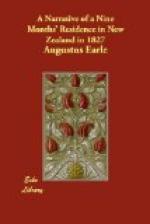Although we were situated in the same latitude as Sydney, we found the climate of New Zealand infinitely superior. Moderate heats and beautifully clear skies succeeded each other every day. We were quite free from those oppressive, feverish heats which invariably prevail in the middle of the day at Sydney, and from those hot pestilential winds which are the terror of the inhabitants of New South Wales; nor were we subject to those long droughts, which are often the ruin of the Australian farmer. The temperature here was neither too hot nor too cold, neither too wet nor too dry. Reflecting on this country—its situation, inhabitants, and climate—I felt convinced that, if it were the object of our Government to form a new colony, they could not select a more desirable spot than New Zealand. When we left Sydney, a disease was raging there of a most disagreeable nature, namely, catarrh. As usual, it affected strongly the eyes and nose, and generally proved fatal to the very old and to children. We found the poor natives here subject to the same complaint, which they called the “Murray,” or “Murraybad”; and they declared they caught it from us Europeans.
I could scarcely refrain from laughing while witnessing the strange methods they adopted to effect a cure. Sometimes they would envelope their heads entirely in green leaves, at other times they would almost roast themselves in a heated hut; but their universal remedy, and the one they generally found successful, was starvation, which is, in fact, the doctor who cures them of all the diseases the Europeans have imported amongst them: and, I confess, I have often been amazed at their rapid recovery from maladies which I should have thought incurable. The other day I asked the opinion of a clever medical man, who came here with one of the whalers, and he informed me the only cases he had met with amongst the natives, which terminated fatally, were a few instances of consumption.
After the novelty of our savage life began to wear away, I rambled much about the country, in order to form some judgment of its capability of improvement. I never possessed any practical knowledge of farming, and therefore cannot give a scientific opinion or description of the different soils. In whatever direction I travelled, and at this time I had crossed the country in various directions several times, the soil appeared to me to be fat and rich, and also well watered. From every part of it which the natives have cultivated, the produce has been immense. Here, where the finest samples of the human race are to be found, the largest and finest timber grows, and every vegetable (yet planted) thrives, the introduction of European grasses, fruits, etc., etc., would be a great desideratum. Were this done, in a very short time farms would be more eagerly sought after here than they now are in New South Wales. All the fruits and plants hitherto introduced by the missionary establishments have succeeded wonderfully. Peaches and water melons now were in full season; the natives brought baskets full of them to our door every day, which they exchanged with us for the merest trifles, such as a fish-hook, or a button.




